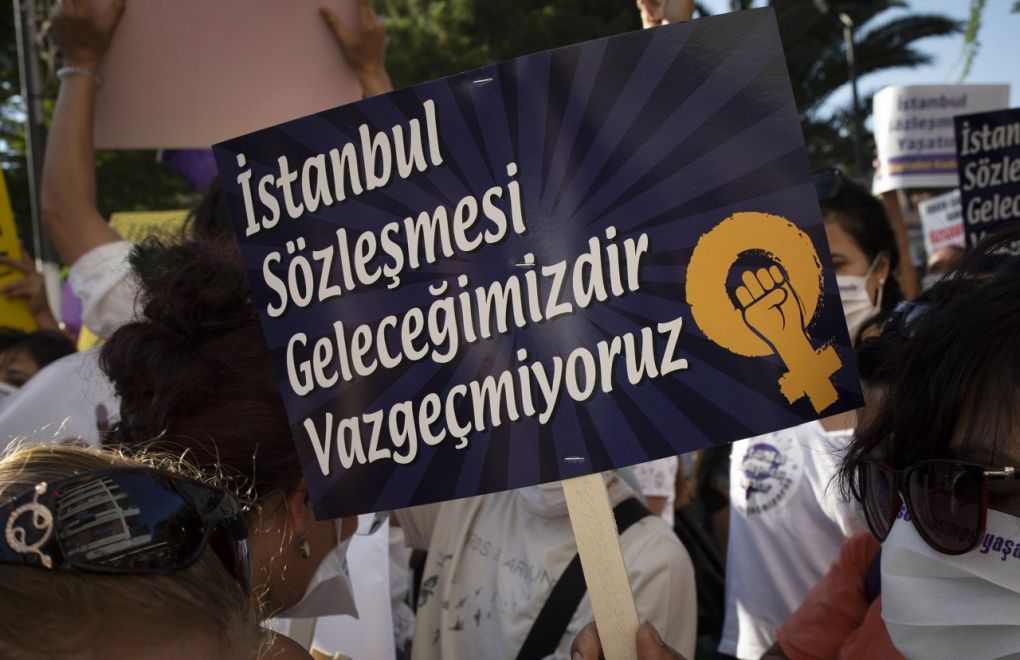"İstanbul Convention is our future, we don't give up" (by Serra Akcan/csgorselarsiv.org)
Click to read the article in Turkish
On the 10th anniversary of the Istanbul Convention today (May 11), the Ankara embassies of 19 countries have released a joint statement titled "The Istanbul Convention: for a better future for all."
Stressing that Turkey was the first country to ratify the Council of Europe Convention on preventing and combating violence against women and domestic violence, the embassies have said that they are "saddened" by Turkey's decision to withdraw from the Convention.
Reminding the public that "Turkey was one of the strongest supporters during the creation" of the Convention and "made substantive contributions that were highly recognized", the embassies have stated:
"Therefore, on the occasion of the 10th Anniversary of the signing of the Istanbul Convention, we would like to express our sincere hope that the Turkish government would reconsider its withdrawal decision."
The statement has also noted that "there is no hidden agenda here – as sometimes is claimed – related to gender identity and sexual orientation."
The undersignedThe Ankara embassies of Austria, Belgium, Canada, Czechia, Denmark, Finland, France, Germany, Greece, Ireland, Italy, Luxembourg, Netherlands, Norway, Spain, Sweden, United Kingdom, United States, New Zealand. |
The full statement of the 19 Ankara embassies reads as follows:
'We are saddened by decision of withdrawal'
"Turkey was the first country to ratify the Istanbul Convention on preventing and combating violence against women and domestic violence. Since then much progress has been made in terms of equal rights, women's participation and leadership, and national legislation with regard to preventing and combating violence against women and domestic violence.
"On 20 March 2021 the Turkish government announced its decision to withdraw from the Istanbul Convention.
"We are saddened by this decision. Turkey was one of the strongest supporters during the creation of this instrument in 2011. Turkey made substantive contributions that were highly recognized.
"Therefore, on the occasion of the 10th Anniversary of the signing of the Istanbul Convention, we would like to express our sincere hope that the Turkish government would reconsider its withdrawal decision.
'Violence has increased during pandemic'
"The Council of Europe Convention on preventing and combating violence against women and domestic violence, also known as the Istanbul Convention, was opened for signature on 11 May 2011 and entered into force on 1 August 2014. It is the most far-reaching instrument in Europe to set legally binding standards to prevent gender-based violence, protect victims of violence and punish perpetrators.
"The Convention has been ratified by 34 member states. It offers the most comprehensive legal framework to prevent and combat violence against women. It calls for preventive actions to be taken, but also to support and protect women who have been exposed to violence or are at risk of such violence. It calls for action against the persisting problem of domestic violence, but also aims to protect women and girls from rape, sexual harassment, stalking, online violence and many other acts of violence against women. Violence against women and domestic violence is a sad reality in all of Europe, and in the rest of the world.
"Unfortunately, in Turkey, like in many other countries, violence against women has increased during the Covid-19 pandemic. Reversing the decision to withdraw from the Istanbul Convention would help Turkey preserve a comprehensive framework to protect women.
'It cannot be considered a private matter'
"What can be more negative for the cohesion in a country and solidarity amongst its people than domestic violence? How can we build a self-respecting society if emotional or physical traumas experienced at home remain silenced and stigmatized? How can we ensure a strong and prosperous future if part of the population is not able to fulfil its potential?
"Gender equality aims to create equal opportunities for women and men. It allows for certain persistent stereotypes of women and men to be addressed and for all children to have equal opportunities.
"It is this diversity, these freedoms and rights of our democratic societies that we seek to defend and protect. Acknowledging the progress that Turkey has made, we call on the Turkish Government to look at the Convention as an international agreement that domestic violence and violence against women are not acceptable and cannot be considered as a private or a family matter. We need to acknowledge that gender-based violence is a serious human rights violation that needs to be addressed accordingly.
"National measures alone do not reach the same levels of protection as the Convention does. Multilateralism matters, as a principle and in reality for the safety of women and girls.
'For a better future, for all'
"There is no hidden agenda here – as sometimes is claimed – related to gender identity and sexual orientation. The Convention does not require an adaptation of national legal systems in that respect.
"State Parties have sufficient leeway to implement the Istanbul Convention in accordance with their national decisions, which doesn't take away the States' obligations, under the European Convention on Human Rights, to protect the fundamental rights of all, including LGBTQI people.
"The Istanbul Convention has already had a positive impact on women's lives across Europe. Calling on governments to prevent violence against women, to protect and help victims and to punish perpetrators, in a comprehensive effort to end such violence, means restoring the dignity of women who have become victims of violence.
"The European Convention on Human Rights attaches paramount importance to this value. The Istanbul Convention plays an important role in making a change for women and girls. For a better future, for all."
What happened?
The Council of Europe Convention on preventing and combating violence against women and domestic violence - the İstanbul Convention - was opened for signature in İstanbul on May 11, 2011. Turkey became the first country to ratify the Convention in 2012, followed by 33 other countries from 2013 to 2019. The Convention came into force on August 1, 2014.
Turkey has withdrawn from the İstanbul Convention with a Presidential decision published in the Official Gazette on March 20, 2021.
The decision in question said that "the Council of Europe Convention on Preventing and Combating Violence Against Women and Domestic Violence, which was signed by Turkey on May 11, 2011 and approved with the Cabinet Decree no. 2012/2816 on February 10, 2012, shall be terminated on the part of Turkey as per the Article 3 of the Presidential Decree no. 9."
Following this Presidential decision published at midnight, several social media users, women's rights defenders, lawyers and politicians, denounced the decision, recalling that the convention was unanimously approved at the Parliament and stressing that it is not possible for Turkey to withdraw from an international convention with a Presidential decision.
After the Presidential decision pulling Turkey out of the İstanbul Convention was met with criticisms and objections in both Turkey and around the world, the Communications Directorate of the Presidency released a written statement about the issue on March 22.
"As known, Turkey was the first signatory to the Istanbul Convention," the statement noted, arguing that the "İstanbul Convention, originally intended to promote women's rights, was hijacked by a group of people attempting to normalize homosexuality – which is incompatible with Turkey's social and family values. Hence the decision to withdraw."
The protests are still ongoing. (NÖ/SD)














